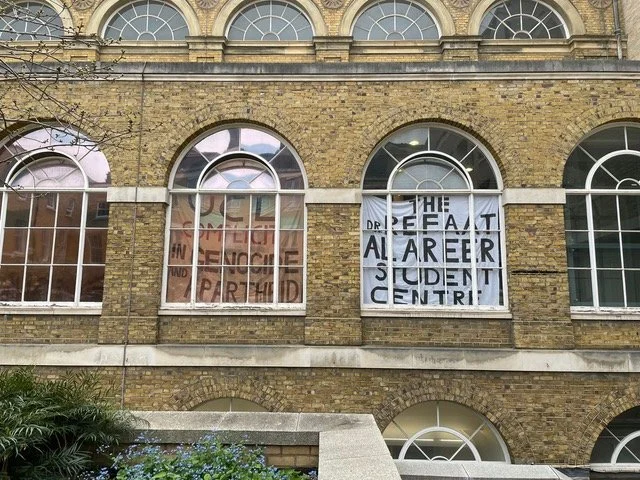Inside the JBR Occupation: What you need to know
On Wednesday 13th March the Action for Palestine group, formed of students and staff at UCL, launched an occupation of the Jeremy Bentham Room (JBR), right in the heart of campus. The motivations of the group are two-fold: to hold the university administration accountable for what they describe as “silence and complicity” in the “genocide and occupation” of Palestine; and to increase the visibility of the Palestinian cause on campus.
As part of the occupation, the group have released ten demands—seven of which are directed at the UCL administration, with the other three directed at the Students’ Union. These demands include requests for transparency with regards to UCL and SU funding, cutting ties with arms companies and establishing a scholarship fund of at least £250,000 for Palestinian students, as well as providing a place of sanctuary for Palestinian academics.
The occupation forms the latest chapter in a wider strategy in support of the Palestinian cause: the group’s previous actions have included protests in the main quad, poetry recitals outside of the IOE and a vigil organised in partnership with UCL alumni that was held outside of the student centre.
A spokesperson from the group commented how this previous action had failed to get the desired attention from senior figures at UCL and the SU: “we have walked out, sat in, picketed, and written emails and open letters to the Provost and UCL management for months, to no avail.” The activists felt that they were left with “no choice” but to escalate their actions.
Situated in the iconic JBR, the occupation has had a wide-spread impact—forcing lectures to be relocated and sparking countless conversations. The windows of the JBR, which face onto the Wilkins Terrace and the Japanese Garden, contain banners in support of Palestine, as well as some of the demands of the group, including the demand to formally rename the Student Centre to the “Refaat AlAreer Student Centre” in recognition of the alumni's contribution to the UCL student community.
The entrance to the JBR is also dominated by a sign declaring the room to be an “Apartheid Free Zone”. This sign became contentious during a counter-protest on Friday 15th March in which Metropolitan Police Officers attended the occupation following a complaint about a symbol used in the protest. In video footage viewed by Pi journalists, police officers can be seen asking the group to move the sign despite no clear violation of UK law.
Students and staff from the group stood their ground and, following the attendance of senior figures from UCL security, the police left the scene. A member of the group who was there at the time described the police officer’s at “antagonistic.”
We have reached out to the Metropolitan Police for comment and await their response.
The Action for Palestine group has faced several counter-protests since the occupation began, including the impersonation of a Pi Media journalist. These individuals have sought to disrupt the occupation, challenging activists in often aggressive tones.
A spokesperson for the group said that they have subsequently developed a protocol to deal with such incidents in order to protect their activists from harm. This involves activists engaging cautiously with those who appear confrontational. The group has decided it is sometimes better to share leaflets documenting their cause as counter-protestors are often “unwilling to listen and engage” with what the activists have to say.
Despite the counter-protests, the spokesperson said that “the mood is positive” inside the occupation. For the activists, the priority is spotlighting what they describe as the “Palestinian struggle for liberation.” They do not wish to get involved with campus politics, nor engage with angry counter-protestors. Instead, the occupation is about accountability and visibility.
UCL staff have shown a great deal of support towards the group, with the UCL branch of the Universities and Colleges Union (UCU) voting in favour of supporting their “apartheid free zone”. UCL catering staff also provided the group with coffee and pastries following their first overnight stay in the JBR, whilst security staff have shared food with the activists.

